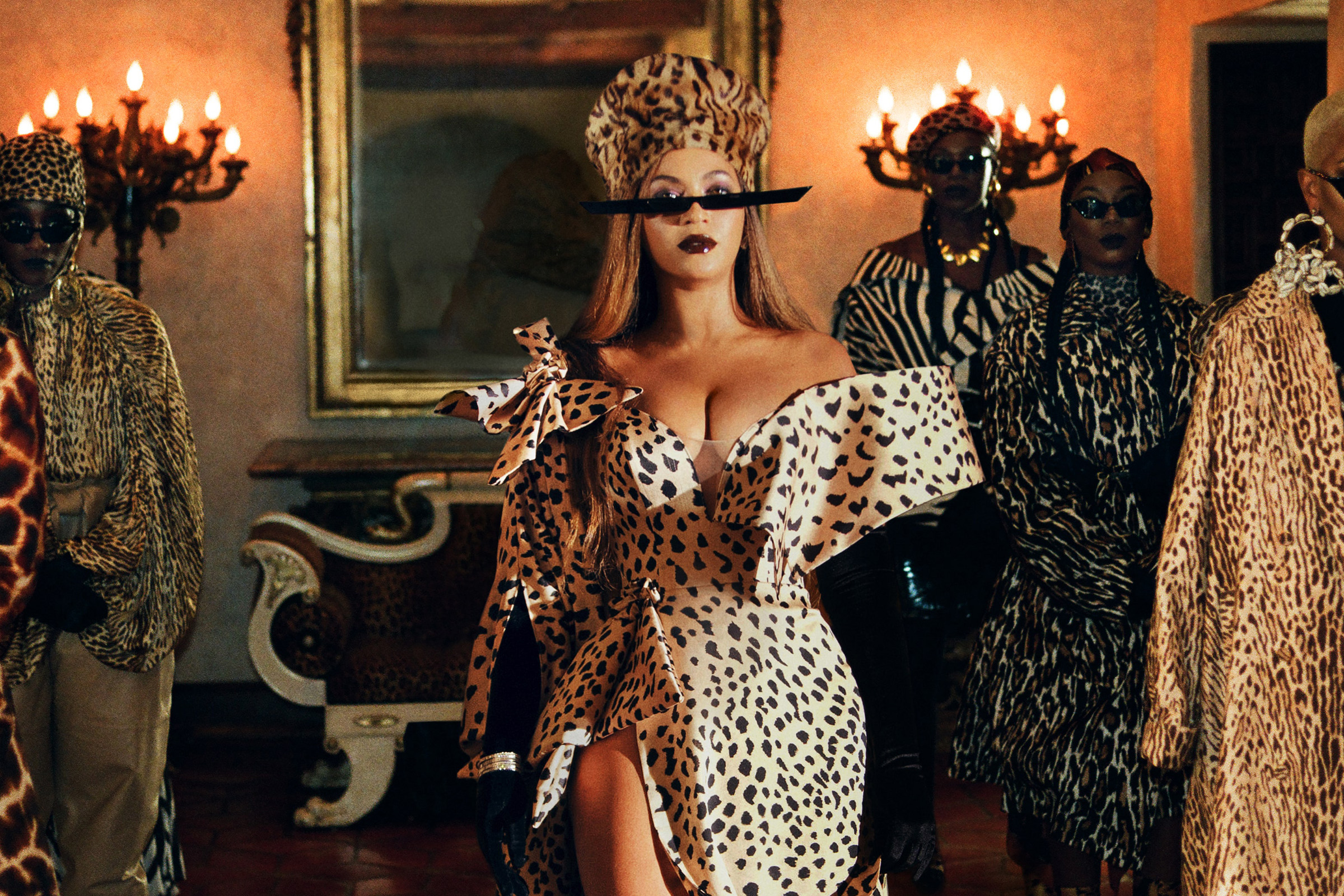Here's the kind of indulgence that is only permissible when an A-list musician intersects with the richest movie studio in the universe. On a nuts-and-bolts level, Black is King was conceived as a "visual album", tying in with the old-school album of audio recordings Beyoncé put out to mark the release of Disney's digitised redo of The Lion King last year. It's an 85-minute collection of music videos, some of which see the singer collaborating once again with the directors, choreographers and creatives who helped make 2016's Lemonade such a successful audio-album-turned-visual-album. Nothing, however, can prepare you for just how extravagantly nuts those nuts-and-bolts are. Black is King bears some tangential relation to the film that inspired the music: the occasional snatch of dialogue from the new Lion King points up how and where it might align. Yet the creative brief was surely Beyoncé Triumphantly Returns To Africa, in an operation that seems likely to have involved a fleet of at least four private jets, carrying an entourage running into the hundreds if not thousands, and a cargo hold stuffed with roughly a year's worth of costume changes. As a work, it makes scant pretence to cohesion: it borrows from the Bible as much as its cinematic source riffed on or ripped off Hamlet, and not even Beyoncé herself appears to have been around for all of it. The crucial thing is that everyone and everything looks astonishing; every frame bears witness to the best composition, clothing and colour correction money can buy in the year 2020. Beyoncé's Africa isn't so far removed from a Vogue photoshoot or the Bizarro Africa of Black Panther's Wakanda: it's fantasy, not reality. But it's fantasy and then some, the fantasy that only follows from big blank cheques. I think Disney+, which is where the project has ended up this pandemic year, may need to initiate a new algorithmic category for its subscribers to toggle between. Call it Cheese Dreams Of The Rich and Famous.
On one level - musical - Black is King emerges as an expensive failure. There isn't a single song that struck this ear as catchy enough to whistle on the walk to the bus stop, let alone to last. The usual shortcomings of 21st century mass-market pop are all in evidence: hopelessly watery lyrics, melodies produced out of existence. Beyoncé recruited a baker's dozen of knob twiddlers to assist her in the studio (including Diplo, Labrinth and DJ Khaled), and while they tossed handfuls of hooks and beats into the mix - many of those half-inched from the Afrobeat scene - very few finally stick. (In this, it may have been the perfect accompaniment for a largely computer-generated Lion King remake.) As a state-of-the-art imagebank, however, the project operates on a whole other level. The best review of Black is King might simply be a four-word upper-case command: JUST LOOK AT IT. Blunt as that instruction might sound, it covers the basics here - that this is a hell of a thing to be looked at - while also gesturing towards its most overtly political dimension: the visibility the film grants to Black lives, bodies, hopes and dreams. The sequence laying out what life at home with Bey and Jay-Z must be like - complete with human chess, synchronised swimming à la Busby Berkeley, and so many sweetmeats the camera practically swoons into a diabetic coma - is probably best taken with a large, corrective pinch of salt. Even the rich have fantasies of what it must be to be rich; it's what gets them through all those meetings with accountants and lawyers, the long sessions with the personal trainer.Yet whenever the camera moves off this project's prime mover and alights upon less celebrated Black subjects, Black is King becomes unexpectedly moving: the grand gesture is suddenly made intimate, affectionate. Here is a multimillionairess using all of her resources to offer a leg up to people who presumably have far less in the bank; here, too, a reminder of how inspiring pop culture can be whenever it troubles to look beyond itself. Even the lower-key segments - the ones that look most like common-or-garden pop promos you'd catch in passing while watching music television - pique the eye in some way, whether via an unfamiliar face, an angular dance move or the sequins on an outfit; and there are sequences in Black is King that make Tarsem Singh - the sometime pop-promo genius who went on to direct the properly spectacular The Fall and Immortals - look as dourly minimalist as Robert Bresson. Singh, I think, would love one particular image here: that of the woman with The Longest Hair In The World, posed atop a very tall ladder so as to flaunt her locks at their fullest extension. Such visual pleasures tend to be exhibited on screen for no more than five seconds tops, which is emblematic of the general approach: never mind the tunes, feel the riches. Black is King lets down its hair because - well, why not? Because it's worth it. Conceptually, Beyoncé has merely made a colossal, slap-up "premium dining experience" out of the meal chef Gary Byrd prepared over the ten minutes of 1983's "The Crown". (Just the one producer there: Stevie Wonder. Sometimes one producer is all you need.) Yet as an artefact, I suspect Black is King will prove more enduring than the plasticky duplication of The Lion King itself. If nothing else, it'll make you think anew about how amazing it must be to be Beyoncé: to live in a perfume ad every day of your life, to have a private army of stylists on hand so as to ensure you look like Cleopatra at every turn. And it's not like she needs that much help.
Black is King is now streaming via Disney+.

Great post thankss
ReplyDelete